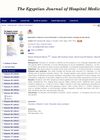March 2023 in “Authorea (Authorea)” Early diagnosis and treatment of systemic-onset juvenile idiopathic arthritis are crucial for improvement.
[object Object] January 2008 in “Elsevier eBooks” The young woman with epilepsy became seizure-free after finding the right combination of medications.
 38 citations,
November 2005 in “Epilepsia”
38 citations,
November 2005 in “Epilepsia” Levetiracetam is widely used and generally well-tolerated for treating idiopathic generalized epilepsies, with tiredness as the main side effect.
5 citations,
January 1999 in “Pediatric Dermatology” A young girl had both alopecia areata and immune thrombocytopenic purpura at the same time, suggesting a possible link between the two.
2 citations,
April 1989 in “PubMed” Canrenone effectively reduced hair growth and testosterone levels in women with excessive hairiness.
 2 citations,
January 1984 in “Progress in neuro-psychopharmacology & biological psychiatry”
2 citations,
January 1984 in “Progress in neuro-psychopharmacology & biological psychiatry” Benzodiazepines changed hormone levels but did not affect hair growth in women with idiopathic hirsutism.
September 2015 in “American journal of biomedicine” 17 citations,
October 1994 in “The Journal of Clinical Endocrinology and Metabolism” 7 citations,
February 2003 in “Gynecological Endocrinology” 6 citations,
January 1977 in “Archives of dermatological research”  24 citations,
May 2010 in “Veterinary dermatology”
24 citations,
May 2010 in “Veterinary dermatology” Oral ciclosporin A and topical treatments both reduce hair loss and scaling in dogs with sebaceous adenitis, but using both together is most effective.
 70 citations,
August 1995 in “Fertility and Sterility”
70 citations,
August 1995 in “Fertility and Sterility” Finasteride reduces hairiness and androgen levels in women with unexplained excessive hair growth.
 13 citations,
January 2012 in “International Journal of Trichology”
13 citations,
January 2012 in “International Journal of Trichology” Most hirsutism patients had idiopathic hirsutism or PCOS, with hormonal imbalances and signs like acne and irregular periods.
11 citations,
August 2019 in “PubMed” Hirsutism in women is mostly caused by polycystic ovary syndrome and idiopathic hyperandrogenism.
 January 2023 in “Scholars journal of applied medical sciences”
January 2023 in “Scholars journal of applied medical sciences” The main causes of hirsutism in Jordanian women are PCOS and idiopathic hirsutism.
 February 2010 in “Journal of The American Academy of Dermatology”
February 2010 in “Journal of The American Academy of Dermatology” White hirsute women with PCOS have higher insulin resistance, but similar nitric oxide and fibrinogen levels compared to those with idiopathic hirsutism.
Most excessive hair growth is due to idiopathic hirsutism or PCOS; treatment starts with cosmetic methods and drugs like cyproterone acetate or spironolactone, with results in 6-12 months.
[object Object] March 2023 in “Current Pharmaceutical Design” Spironolactone is effective for idiopathic hirsutism but has limited effects on other PCOS symptoms.
 October 2022 in “The Egyptian Journal of Hospital Medicine”
October 2022 in “The Egyptian Journal of Hospital Medicine” Females with idiopathic hirsutism have higher levels of omentin-1, which may lead to excessive hair growth.
 947 citations,
February 2004 in “The Journal of Clinical Endocrinology and Metabolism”
947 citations,
February 2004 in “The Journal of Clinical Endocrinology and Metabolism” Most women with excess male hormones have Polycystic Ovary Syndrome, and hormonal therapy can improve symptoms but may cause side effects.
 352 citations,
January 2006 in “The Journal of Clinical Endocrinology and Metabolism”
352 citations,
January 2006 in “The Journal of Clinical Endocrinology and Metabolism” Most women referred for excess male hormone symptoms had polycystic ovary syndrome (PCOS), with other conditions being less common.
 195 citations,
May 2003 in “Obstetrics and gynecology (New York. 1953. Online)/Obstetrics and gynecology”
195 citations,
May 2003 in “Obstetrics and gynecology (New York. 1953. Online)/Obstetrics and gynecology” Most women with excess hair growth have an underlying hormonal issue, often treated with medication and hair removal methods.
 183 citations,
March 1982 in “JAMA”
183 citations,
March 1982 in “JAMA” Spironolactone is a safe and effective treatment for reducing excessive hair growth in women.
 135 citations,
March 1984 in “Fertility and sterility”
135 citations,
March 1984 in “Fertility and sterility” Higher levels of unbound testosterone are linked to increased insulin resistance, especially in women with polycystic ovary syndrome.
 80 citations,
March 2000 in “Journal of cutaneous pathology”
80 citations,
March 2000 in “Journal of cutaneous pathology” The VVG stain effectively differentiates scar tissue from normal skin and helps classify types of permanent alopecia.
 75 citations,
November 2007 in “Clinical endocrinology”
75 citations,
November 2007 in “Clinical endocrinology” Certain medications including flutamide, spironolactone, and others effectively reduce excessive hair growth in women, especially when combined with lifestyle changes.
 75 citations,
October 1999 in “European journal of endocrinology”
75 citations,
October 1999 in “European journal of endocrinology” Finasteride is a safe, effective treatment for hirsutism with fewer side effects.
 75 citations,
March 1999 in “Fertility and sterility”
75 citations,
March 1999 in “Fertility and sterility” Finasteride, CPA, and flutamide are all equally effective in reducing excessive hair growth in women.
 75 citations,
May 1986 in “Clinics in endocrinology and metabolism”
75 citations,
May 1986 in “Clinics in endocrinology and metabolism” Male hormones are important for hair and oil gland development and can cause conditions like excessive hair growth and acne.

















